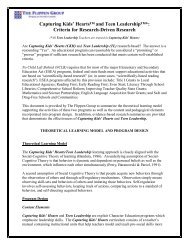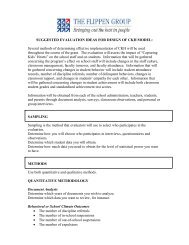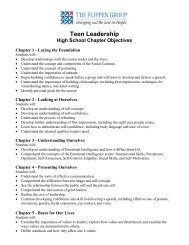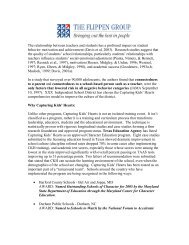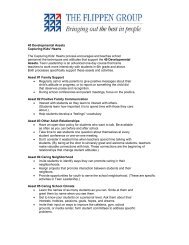Smart & Good High Schools - The Flippen Group
Smart & Good High Schools - The Flippen Group
Smart & Good High Schools - The Flippen Group
- No tags were found...
You also want an ePaper? Increase the reach of your titles
YUMPU automatically turns print PDFs into web optimized ePapers that Google loves.
do not self-identify as “character educators,” at least notinitially. This, we noticed, was because they tended toequate “character education” with “discussing ethics.” Forexample, one science teacher said, “I teach chemistry; Idon’t teach character. Occasionally, I might touch on anethical issue, but I really don’t have a lot of time for that.”“Performance character” gives highschool educators a new language fordescribing their daily work.However, when these same teachers began to speak aboutwhat students need to succeed in their classroom, theydescribed character outcomes—specifically, performancecharacter outcomes. <strong>The</strong>y want students who will be ableto demonstrate:◆ diligence—commitment to doing ajob or assignment well◆ perseverance in the face of difficulty◆ dependability, including the abilityto do their part ona project◆ responsibility for having therequired supplies ormaterials◆ orderliness in their work◆ the ability to set goals and monitor progress toward therealization of those goals.For example, the chemistry teacher we interviewedemphasized many facets of academic responsibility withher students:I tell my students, “You’ll do better in this class if you keepan organized notebook. But it’s your responsibility to dothat; I’m not going to check it. You’ll also do better ontests and in the course as a whole if you do the homework.But that’s your responsibility as well.” And I tell them thatif they miss a class, a responsible student calls his or herlab partner to get the assignment.When you get to this point in the discussion, a light bulbgoes on and practitioners say, “If this is what you mean bycharacter education, then, yes, I’m a character educator.In fact, I spend much of my time and energy trying to getthese outcomes, because without these qualities of character,it is unlikely that students will be able to learn andTechnical skills andintellectual brilliance, bythemselves, do not leadto a world worth livingin.CHAPTER 2: Performance Character and Moral Characterdevelop in the academic disciplines.” Bingo.“Performance character” thus gives high school educatorsa new character language for describing the academicendeavor of teaching and learning that is the focus oftheir daily work. Of course, good teachers, as they helptheir students develop performance character, also payattention to moral character: how students treat theteacher, treat each other, care for classroom materials andequipment, honor expectations of honesty on tests andother work, and so on. “I run a classroom based onrespect,” the above-quoted chemistry teacher said. “Thatincludes standing for the pledge.” But our point here isthat defining character to give a prominent place to performancecharacter as well as moral character profoundlyalters how secondary-level educators see character education.Character development as the pursuit of excellencein learning, not just as the fosteringof ethical behavior, is, for high schoolteachers, a “fit.”In a similar way, giving performancecharacter its due offers high schoolstudents, especially in today’s competitiveenvironment, a new reason topay attention to character. In oneChicago area high-achieving, middle—MOSE DURST to upper-class high school, a seniorreported that fellow students hadtaken to saying, “If character counts,then show me what it will do for my GPA.” Now, we obviouslywant students to believe that character is importanteven if it doesn’t impact their GPA; we are obliged to bemoral people even if doing the right thing is not rewarded—indeed,even if, in some situations, it costs us something.That said, however, shouldn’t educators be able toshow students that character can contribute to their academicperformance?Performance character helps allstudents achieve the excellence ofwhich they are capable.<strong>The</strong> performance character-moral character distinctionenables us to do that because it establishes a role for characterin the realization of human excellence. Regardlessof natural talent, persons who are diligent and disciplined,maintain a positive attitude, and persevere in theface of difficulty should, over time, see a positive impacton their performance indicators (and, to be sure, GPA isonly one indicator and arguably less important than other27<strong>Smart</strong> & <strong>Good</strong> <strong>High</strong> <strong>Schools</strong>




